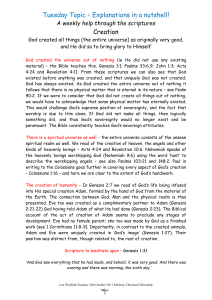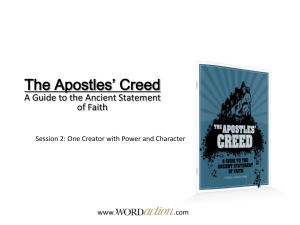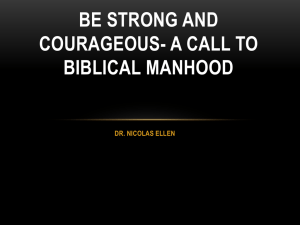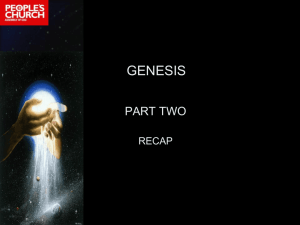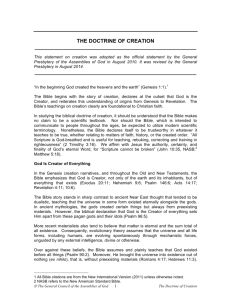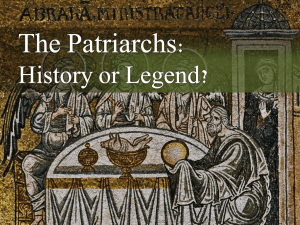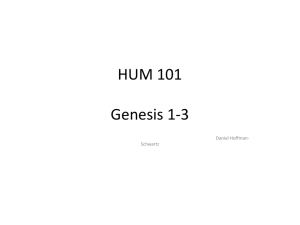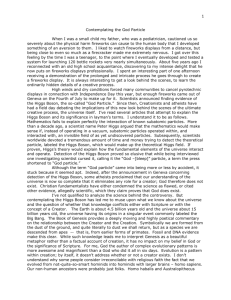Extension material - concept_of_god__god_as_creator
advertisement
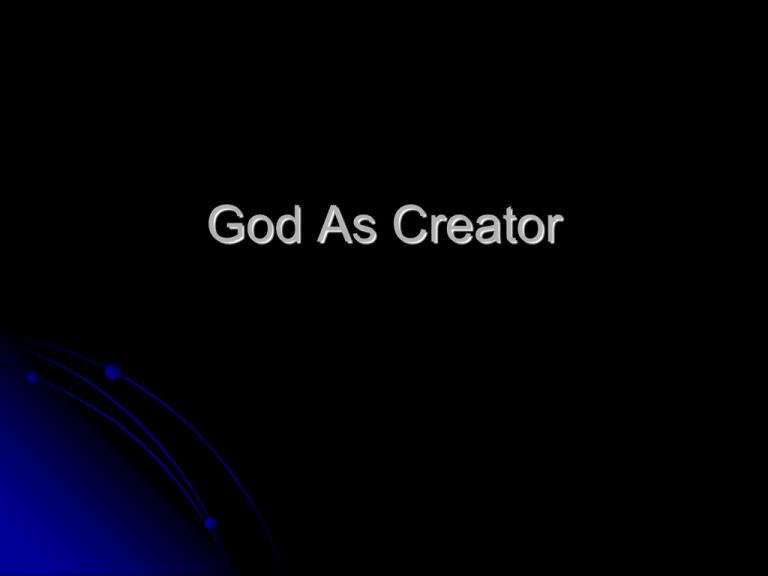
God As Creator Key Terms Theism - belief in the existence of a god Atheism - A conviction that there is no such being as god Agnosticism - the view that there is not sufficient evidence to decide Pantheism - an identification of god with the physical universe Panentheism - the belief that god is within everything •Deism - The idea that God is an external designer that now has no interest in ‘His’ creation. •Idolatry - The literal identification of God with any individual or concept. Swinburne describes ‘God’ as : “a person, without body, (a spirit), present everywhere, the creator and sustainer of the universe, a free agent, able to do everything (omnipotent), knowing all things, perfectly good, a source of moral obligation, immutable,eternal, a necessary being, holy and worthy of worship.” The Book of Genesis It is the first book of the Pentateuch, the five books of Moses. Although parts of the book are attributed to Moses, most is written by anonymous scribes. The ‘editor’ has drawn material from two different sources, the Priestly source (c. 5th Century BC) and the Yahwist source (c. 8th Century BC). It is part of the oral tradition. Book is divided into two sections – Chaps.. 1-11 deal with the beginning of man’s history and 12-50 the beginnings of Israel’s history. It is considered to be divinely inspired. The book is thought of as an example of Wisdom literature and is therefore poetic in its outlook, as are the Psalms. This is significant when addressing the nature of myth and truth. God As Creator Traditional theism has asserted that God created the world and created it ‘ex nihilo’, out of nothing. This implies that God is not an external agent working with matter, nor is he an agent over against other agents. He is the origin of everything. This idea is akin to Aristotle’s FINAL CAUSE. To say God is creator implies that everything is alive with his life. God has no ‘other’. Genesis chapters 1-3 show how the Jewish tradition understood god as creator and sustainer • The Judeo-Christian tradition accepts God as creator. • God is described in genesis as YAHWEH - a monotheistic creator who chooses to interact with his creatures. • The genesis creation narrative describes the origin of the universe as a direct act of god. Creation ex nihilo The concept of creation ex nihilo has two collararies – 1. There is an absolute distinction between God and Creation. To all eternity God will be distinct from creation. 2. All creation is dependent on God. The notion of creation ex nihilo expresses itself in dependence on God from moment to moment. Key Points in Genesis •The first chapter begins with the simple statement that ‘God created the heavens and the earth’ (Hebrew for creation is ‘bara’) •‘Bara’ is only used 47 times in the OT and used to describe God’s activity. ‘It used to denote the creation of something new, by the exercise of the sovereign power of God, transcending the power of mankind’ (Driver) •The Creation narratives are almost certainly myth – but like all myth they contain truth. These truths are religious truths. In summary Genesis appears to say that: 1. The account is unambiguously monotheistic. God is described as transcendent and pre-existent. The world owes its being to the divine action of a sovereign God. 2. Creation is good. The OT creation myth is characterized by the warmth and tranquility of its description of the origin of the universe. 3. God does not will evil. It occurs as a result of the fall of mankind, an act of rebellion that causes sin to enter the world. The question of the problem of natural evil is not addressed in the narrative. 4. The world exists for mankind – The climax of the creation narrative is to be found in Genesis 1:26-29. This describes how man was made in the image and likeness of God. God breathes life into them ‘samah’ and this distinguishes mankind from all other forms of living creatures. We are given dominion over creation but also required to act as stewards over creation. •Genesis Chapter 2 - the first man is described as Adam – although the word adama means mankind in Hebrew. This may imply that Adam is symbolic for all humanity. Adam is created by God from the ground (hence the fact that adama has its roots in the word damah, which means tillable ground). •God breathes life into Adam – samah – and this distinguishes ‘him’ from other created beings. •Creation of Eve from Adam can be understood as a reference to the fact that man and woman need each other. A sense referred to in the marriage service where the couple become ‘one flesh’. Genesis 3 The Fall of Man •Man is tempted by the snake (nahas) and a link with Satan is implicit here and explicit in the Gospel of Luke. •The result of Sin – verses 8-24 •The lack of repentance forces God’s hand. There would be no second chance. •Verse 15 – referred to as the Protevangeleium. The conflict between the Devil and Mankind. •Adam and Eve are expelled from Eden as an act of Grace – eternal life is meaningless unless you have communion with the creator God. Key Themes in Genesis: Man is made in the image of God •Man is not supposed to be seen as having the form of Yahweh – that is merely anthropomorphism. •Man is God’s representative in this world – as such ‘he’ exercises a degree of dominion over creation. •The concept of stewardship is developed, which has distinct obligations attached to it – we are merely stewards of the earth during our lives upon it. We have a duty of care that must be passed down through the generations. •The material of creation is shown to be transient and mortal – only one living creature is given the possibility of eternal life. Genesis and Science Distinction must be made between cosmology and evolution Fundamentalist vs. Non Fundamentalist. Genesis cosmology – God is at the heart of creation – link to Aristotle – God is the FINAL CAUSE of the universe. Genesis is a myth that presents the case WHY not HOW Evolution can be seen as both MICRO and MACRO All accept MICRO – divided over MACRO The view that Genesis may owe more to myth than literal fact is not a new one. Origen in the 3rd Century raised that possibility in “The writings of the AnteNicene Fathers”, IV, 365 (see Hick) Did the universe have a beginning ? St Thomas Aquinas was the first to suggest that the universe may not in fact have been created but be eternal. However, he felt that the Bible indicated a beginning so removed that possibility from his teaching. Augustine thought that creation did take place in time but that time is itself an aspect of the created world. If this is true then, as relativity theory indicates, time is internally infinite. It may however rely on the will of a transcendent God. The question remains “If we accept the Big Bang as the process, then what caused the Big Bang? Where did the material come from that exploded.” Such questions remain unanswered and lead the Theological point that God is the WHY and Science is the HOW when looking at Creation narratives.
